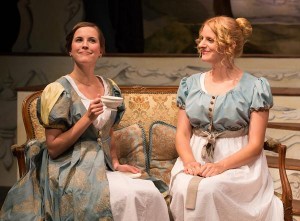Over the past few years, there’s been a surprising and unlikely spark of interest in Jane Austen. Austen’s novels—Pride & Prejudice, Sense & Sensibility, Persuasion, et al—have been required reading for over a century, but of late she’s become a bona fide pop culture icon, inspiring a slew of feature-length fan fiction and weird cross-genre interpretations (let’s not forget that Pride & Prejudice & Zombies was totally a thing). Once our most prized pre-Victorian wordsmith, Austen has become a canvas onto which we project our nostalgia for times and places we’ve never actually known.

It occurred to me while enjoying Lantern Theater Company’s excellent production of Austen’s EMMA—from an adaptation by Michael Bloom—that much of the current wave of Austenmania, while not unwarranted, is a touch overzealous. Any given Austen work is a symphony of clashing neuroses; the stories welcome revision because their components are just as easily found in our modern rom-coms as they are in the yellowed pages of Austen’s volumes. But director Kathryn MacMillan and her crew of technicians understand that EMMA doesn’t need a makeover or new chronological digs. Austen’s deliciously goofy comedy of confusion is perfectly at home among the wavy-haired, impeccably dressed gentry of Highbury.
Lauren Sowa is the title character, an effervescent twenty-one year old who for some godforsaken reason thinks she has a knack for matchmaking. Remember that one day in algebra class when you solved for x without the aid of a calculator and suddenly you thought you were a goddamn wizard? That’s Emma Woodhouse in matters of the heart. Once she joined the hands of her charming governess (Charlotte Northeast) with those of the goofy, jovial Mr. Weston (Nathan Foley), our young heroine became the Angel of Couplehood, if not in reality then at least in her own mind. Now, armed with her newfound romantic hubris, easy, breezy Emma wafts back and forth between the moneyed homes of Highbury, joining unwilling hands as swiftly as we might, as children, have forced square pegs into triangular holes.
The thrill of the production is in the playful nature of the actors. Emma is hilarious and at times touching, but it’s screwball fare—first rate screwball fare, sure, but it’s closer to the stuff of Bringing Up Baby than to the stuffy, upper-class stereotype of the nineteenth-century classics. As such, it works best when the performers are having fun with each other onstage. In this regard, Lantern’s Emma is a success, and the effortless camaraderie within the cast contributes to a blast of an evening in Austenland. Even our less weighty characters steal some quality moments–Peter DeLaurier is perhaps the funniest actor on the stage as Emma’s pessimistic father, and Lee Minora pumps charm and ditzy fun into Jane Fairfax, a character who, in a lesser production, would serve as little more than a dramatic monkey wrench.
MacMillan’s faith in her source material–and her self-proclaimed status as a Janeite of the highest caliber—yields a production that is as reverent in its spirit as it is happily irreverent in its execution. Lantern’s actors don’t just refuse to disappoint; they don’t have time to even think about it. They’re having too much fun. September 19-November 3, 2013, lanterntheater.org.

2 Replies to “EMMA (Lantern): Philly falls for Austenmania”